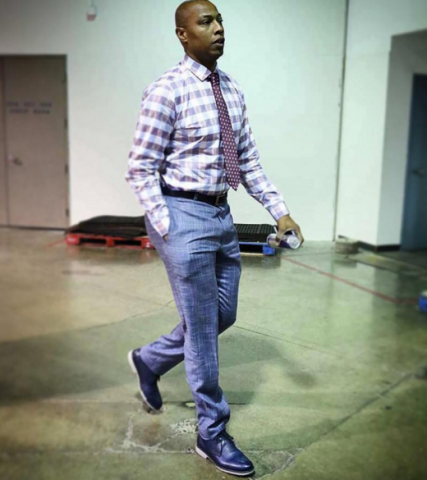- Contact
- Book
- 3D Foundation
- Butler Elite
- Staff
- 2018 17U
- - 2018 17U Photos
- - 2018 17U Videos
- 2019 16U
- - 2019 16U Photos
- - 2019 16U Videos
- 2020 15U
- - 2020 15U Photos
- - 2020 15U Videos
- 2021 14U
- - 2021 14U Photos
- - 2021 14U Videos
- 2022 13U
- - 2022 13U PHOTOS
- - 2022 13U VIDEOS
- 2023 12U
- - 2023 12U PHOTOS
- - 2023 12U VIDEOS
- 2024 11U
- - 2024 11U Photos
- - 2024 11U Videos
- 2025 10U
- - 2025 10U Photos
- - 2025 10U Videos
- Information
- Media
- Bio
NBA veteran Caron Butler talks about the police officer that saved his life

The day that Caron Butler’s life came to a crossroads he was at home sick, in bed, with a bucket next to him when police burst through the door.
It was January 1998 and earlier that day an informant allegedly told police that they bought drugs from the house Butler was living in. Wisconsin police officer Rick Geller got a search warrant, looked at Butler’s previous history (he had spent a year in corrections already) and thought this would be an easy open-and-shut case.
“I’m thinking I’m going to nail this kid,” Geller said during a ‘Champions of Change Law Enforcement and Youth’ meeting event at the White House. “We end up executing the warrant and I get inside and I start talking to this young man.
“And as the conversation progressed all of a sudden I start noticing things instead of stereotyping … I started noticing burns on his hand. And I said ‘where are you working now?’ (Butler replied) ‘I’m at Burger King’. Which incidentally he took a lot of heat from the guys who were still slinging dope out there because why do you want to work at Burger King when you can sling dope. But he hung in there.”
Geller’s SWAT team told him that when they entered the house, they found Butler hiding under the covers. He had $11 in his pocket. “That suggested to me someone who was not dealing drugs at the time,” he said. “So when I talked to him, I could see tears in his eyes.”
The police veteran declined to charge Butler, who would go onto play basketball at UConn and is now in his 14th year in the NBA.
“It could have went the wrong way,” said Butler. “But it didn’t. And he was clowned for the decision that he made because the police officers were like ‘why didn’t you convict that kid?’ And he was like ‘I didn’t think he was guilty and he’s a good person, he’s a good kid.’ And if you have more situations and more officers out there doing that, I think a lot of change will happen.”
If he had been charged, Butler would have been facing a decade in prison. “That means that all my basketball dreams and everything I wanted or could have become would have been gone.”
Butler’s hoping that as he spreads his own story, through appearances with Gellar and his autobiography ‘Tuff Juice’, other NBA players will come forward with stories of their own. And keeping up that dialogue, he hopes, is one way to change the problems with policing in the country now.
“When I first came to the NBA, a lot of guys used to talk about ‘this is where I come from’ or talking about certain situations but when I told a lot of my closest peers that I was telling this story, a lot of guys were like ‘wow, I had a crazy experience with an officer, this is what happened.’
“There’s a lot of bigger name stars out there that have a lot of information and a lot of stories to tell and hopefully can inspire a lot of lives,” he said.
